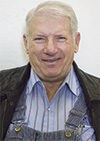A couple of waitresses were sitting at a table within earshot of us, on their break. We overheard part of a conversation; the one asking another the condition of her husband.
With the reply that he should be able to go back to work soon, one passing by asked, “What happened?”
The reply was to the effect that the black ice on the Burnt River Canyon (Interstate 84 runs through this) had snuck up on him and wrecked his truck. This comment became one of our standard jokes.
One of us, after we were outside, inquired about black ice sneaking up on anyone or anything. Black ice, it seems, just stays put, and allows those driving too fast to do their own wrecking of cars and trucks.
They call it black ice because it appears invisible, and if you’re not paying attention to your driving, you find yourself with a thin sheet of ice between your vehicle and the road.
Into one of the areas we hauled was a family that included a divorced son. Some of the time, his daughter would be at the ranch, sometimes not.
The old man told me that alcohol had been the downfall of his son. It cost him his marriage, and was disrupting the life of his daughter. This young man was a plenty capable rancher, and very pleasant to be around.
I never saw him under the influence. The old man had a hunting cabin accessible only by packhorse or on foot. In season, he did some professional hunter guiding.
He told me once that a particular hunter would never come back. This guy knew that his son was an alcoholic, and he teased and pestered the son into taking just one drink, at the hunting camp.
The old man said that his son had been dry for over a year, and with that one drink, he was seven months getting sober.
“Saddest thing you ever saw,” he said.
We delivered hay there one fall, and the boys had just got home from a hunting trip into Idaho, after elk. They didn’t get an elk, but they had bagged a nice black bear.
Momma had bear meat frying, and Lyle and I got a good sample. She breaded the meat, which was cut into finger-steak size pieces, and fried it. It tasted like roast pork, to me. It agreed with me just fine, but Lyle had a bit of difficulty with it.
All the way home, every time we’d pass a dead animal by the side of the road, his mouth would water. And a couple of times I caught him digging in anthills. I was worried for him until fall passed, and he didn’t go off and hibernate.
The hunting cabin had a sad fate, too. The old man’s father had built it, and it became the prize of all the children and grandchildren. Then the federal government came along and established a wilderness area, the border of which ran right through the middle of the cabin. They were going to make him tear it down.
After some fancy maneuvers both in court and on the ranch, which made the wilderness people afraid to enter the area in less than groups of five, at last a compromise was reached.
The cabin could stay. The old man could use it as he had all his life. But on the day he died, it had to be removed. I can imagine the sons telling the wilderness people to take it down themselves, if they dared. South of Jackpot, Nevada, and then west was the Bell Brand Ranch.
One of our helpers, a fellow Norm found at a truck stop looking for work, asked for a job at the ranch. Two weeks later, the other buckaroos asked us to haul him back to wherever we found him.
We declined. A nice little stream ran through many of the meadows and pastures of the ranch. The powers that be noticed that the trout that had been abundant were now hard to find.
They blamed the cattle. They sent in a couple of college girls to build little dams in the streams to give the trout spots of deeper water.
Try as they might, the ranch staff couldn’t get the wildlife people to understand that a family of otters had moved in and were making a good living by eating the trout. (I suppose they thought the cows were eating the trout.)
Anyway, there was a commotion one day. It seems that one of the docile young bulls took a curious interest in the dam makers. And they took exception at his being ten feet away from them.
And he took exception to having building materials and rocks bounced off his head. When suppertime came and the two girls hadn’t made it back to the headquarters, Quentin and a couple of buckaroos went looking for them.
They were safe and sound. Out in the middle of the meadow they had been working in. They had spent most of the morning and all afternoon in a tree. And had no intention of getting out of the tree until someone did something about that ferocious bull; all 600 pounds of him, now almost nine months old.
Quentin said the girls left the next day, and didn’t come back. Down in the Bruneau, Idaho country, we had the misadventure of hauling in year-and-a-half-old hay. There was a reason it was still there.
It was a low-grade feeder hay, and the bales were light. It was a mess to haul, dry and dusty, and of course the wind always blowing the wrong way. We had an off assortment of city kids for helpers. It would have been miserable, except for some of the antics of the helpers.
One of the soft bales rolled back down the elevator three times, and then the fellow feeding the elevator grabbed it, threw it down, and stomped on it repeatedly as he practiced some fluent “French”.
The now chastised bale again rolled off the elevator. When I suggested that he wasn’t speaking the right language to the errant bale, he replied with sign language.
The best one was when one of the crew picked up a dry owl bolus and broke it open in his bare hands. When he found inside it parts of skull and teeth, he asked in a loud voice, “What is this?”
I looked over at what he had and nonchalantly replied, that before the owl ate it, it had been a mouse. You’d have thought he’d just picked up a red-hot horseshoe, as fast as he dropped it! PD









